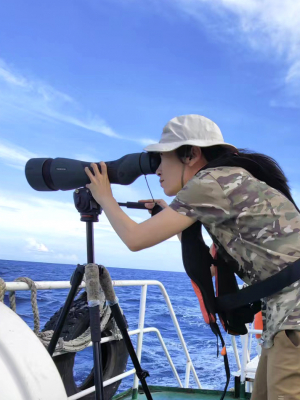
ZHANG Lvbing
Associate Professor / Master's supervisor
Direction:Biodiversity
Research Area:The endangered mechanisms of species and the vulnerability of ecological functions of wildlife under the background of climate change
Email: zhanglb23@mail.sysu.edu.cn
Address: Building 2, Medical Building, No. 66 Gongchang Road, Guangming District, Shenzhen, Guangdong Province
Academic Profile
Associate professor, Sun Yat-sen University, China
My research interests encompass animal ecology, biodiversity and conservation. Much of my current work focuses on studying sensitivity and plasticity of mammals and birds to climate change, especially to extreme climatic events, by examining the patterns and drivers of species responses at population level. I also study the effects of extreme climatic events on structure and functions of animal communities, to understand how relevant resistance and resilience at community level are shaped. I would like to seek interdisciplinary approaches to apply my research findings within the conservation frame of Anthropocene. I serve as the lead lecturer for undergraduate courses Animal Ecology and Conservation Biology, and supervises postgraduate students at PhD and Master’s levels.
Working experience
Associate Professor | 2024.4-| School of Ecology, Sun Yat-sen University, Shenzhen, China
Assistant Professor | 2020.5-2024.3 | School of Ecology, Sun Yat-sen University, Guangzhou, China
Postdoctoral Researcher | 2018.3-2020.4 | School of Environmental Science and Technology, South University of Science and Technology of China. Shenzhen, China
Postdoctoral Researcher | 2017.1-2017.12 | Faculty of Biology, University of Veracruz. Veracruz, Mexico
Education
PhD in Ecology | 2013.9-2016.7 | Institute of Zoology, Chinese Academy of Sciences. Beijing, China.
MSc in Ecology | 2005.9-2008.7 | School of Life Sciences, East China Normal University. Shanghai, China.
BSc in Biology | 2001.9-2005.7 | School of Life Sciences, East China Normal University. Shanghai, China.
Publications
- Zhang, L.B.*, Ma, Z., Liu, Y*. (2024). Biological traits related to life-history strategies mediate responses of terrestrial bird demography to droughts. Journal of Animal Ecology, 93(12): 1868-1880.
- Huang, X., Wang, Y., Liu, Y., Zhang, L.B*. (2023). Data reliability of the emerging citizen science in the Greater Bay Area of China. Avian Research, 14: e100117
- Zhang, L., Ameca, E.I.*, Otero-Jimenez, B., Montaño, S.K., Shea, A., Kelly, T., Andrianoely, D. and Wright, P.C. (2022). Human-induced deforestation increases extinction risk faster than climate pressures: Evidence from long-term monitoring of the globally endangered Milne-Edward's sifaka. Biological Conservation, 274, p.109716.
- Zhang, L., Pacifici, M., Li, B.V., Gibson, L.* (2020). Drought vulnerability among China’s ungulates and mitigation offered by protected areas. Conservation Science and Practice. doi: 10.1111/csp2.177
- Zhang, L., Ameca, E.I.*, Cowlishaw, G., Pettorelli, N. Foden, W., Mace, G.M. (2019). Global assessment of primate vulnerability to extreme climatic events. Nature Climate Change. 9:554–561.
- Zhang, L., Ameca, E.I., Jiang, Z.* (2018). Viability analysis of the wild sika deer (Cervus nippon) population in China: threats of habitat loss and effectiveness of management interventions. Journal for Nature Conservation. 43:117-125.
- Zhang, L., Luo, Z., Mallon, D., Li, C., Jiang, Z.* (2017). Biodiversity conservation status in China's growing protected areas. Biological Conservation. 210:89-100.
- Zhang, L., Jiang, Z.* (2016). Unveiling the status of alien animals in the arid zone of Asia. PeerJ 4, e1545. doi: 10.7717/peerj.1545
- Zhang, L., Cui, S., Huang, Y., Chen, D., Qiao, H., Li, C., Jiang, Z.* (2014).Infar-red camera traps in wildlife research: Issues and Insights. Biodiversity Science, 22(1): 696-703.
Journal Reviewer
Biological Conservation, Biological Invasions, Conservation Biology, Frontiers in Ecology and the Environment, Integrative Zoology, The Innovation Life
Research projects
Leading scientist: Bird vulnerability to tropical cyclones in coastal forests of South China. January, 2022 - December 2024 (National Science Foundation of China - Young Scholar Project)
Major participant: Integrated conservation study of Chinese Crested Tern based on conservation genomics and ecological modeling. January, 2023- December 2026 (National Science Foundation of China)


